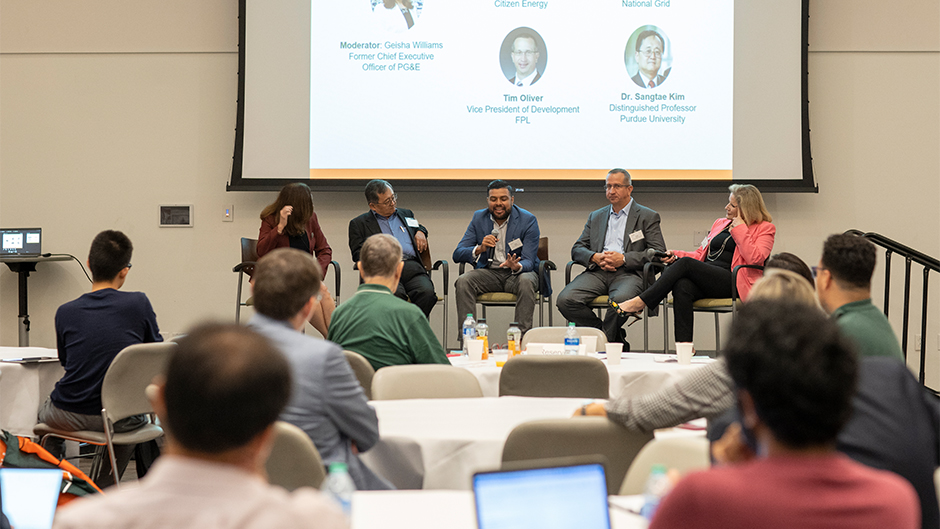By developing innovative clean energy solutions, University of Miami engineering students can help fight global climate change, according to academic and industry leaders at the College of Engineering’s Clean Energy Symposium on September 27 at Shalala Student Center. “This is the single most important engineering problem in the world,” said Edwin Luevanos, CEO, and co-founder, Citizen Energy. “The clean energy transition is happening now, and while we have a lot of resources behind it, it will not happen without you.”
In his opening talk at the symposium, UM President Julio Frenk highlighted the importance of clean energy initiatives and the university’s Climate Resilience Academy, which supports interdisciplinary, problem-driven research and education in partnership with industry, government, universities, and other stakeholders.
Symposium leader Nurcin Celik, Ph.D., Jones Career Development Associate Professor, Department of Industrial and Systems Engineering, announced the launch of the college’s new Miami Center for Clean Energy – a cross-disciplinary team of faculty, students and staff who engage in new initiatives in clean and sustainable energy research and innovation. “Our goal is to develop the next generation of energy leaders through research and educational activities,” she said. The center’s co-directors are Hongtan Liu, Ph.D., aerospace and mechanical engineering, and Ramin Moghaddass, Ph.D. industrial and systems engineering.
Dean Pratim Biswas welcomed engineering students and other participants to the symposium, including Onochie Okonkwo, a Ph.D. student in Biswas’ lab. He is working on the synthesis of advanced catalysts that will be used to produce dimethyl ether (DME) as an alternative to diesel and liquid propane gas (LPG). “Clean-burning DME can be used as fuel for heavy-duty diesel trucks,” Okonkwo said. “It can achieve zero CO2 emissions, while providing reliable fuel for heavy duty cars and motor vehicles that run on propane.”
Joshua Darville, a senior Ph.D. student in Dr. Celik’s research lab (SimLab), helped set up the symposium’s poster session. Darville works on large-scale decision-making for smart city microgrids to reduce energy cost to consumers and the emissions required to produce that energy. “Access to energy is especially impactful for underrepresented communities, who are often disproportionately affected by disasters, and it is a privilege to become an expert on the solution,” he said.
Geisha Williams, B.S. ’83, former CEO of PG&E and board member at Siemens Energy,
Artera Services, and Osmose Utility Services, moderated a panel discussion with
Luevanos; Helen Burt, chief customer officer, National Grid; Tim Oliver, vice president of energy development, FP&L; and Dr. Sangtae Kim, Purdue University.
“Climate change is a real problem,” said Burt. “It’s a human problem, not a math problem that we can solve. Just look at the intensity of the heat waves, and the violence and destruction of the storms. This is the issue that everyone talks about and is trying to resolve.”
Noting FPL’s multifaceted clean energy Real Zero initiative, Oliver said, “For this to work, It’s going to be up to the Engineers. Our CEO’s favorite saying was ‘Never bet against the engineers,’ so it is up to the folks in this room to help us find the solutions.”
When asked how to help boost clean energy, Dr. Kim said, “We have several overarching societal challenges, and you don’t have to spread yourself thin by trying to do everything. We need to work on different challenges simultaneously to make this planet a better place for us all.”

